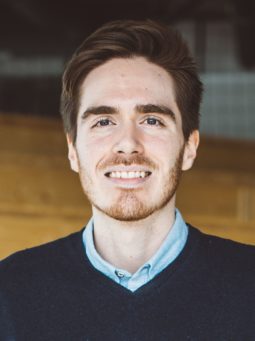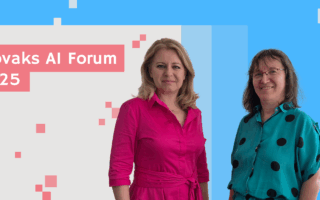What's
European Researcher’s Night from the perspective of our PhD student
The last Friday in September is traditionally dedicated to the European Researchers’ Night. This event brings together researchers and innovators with people who are passionate about science. Thanks to these opportunities, you can get to know our talented researchers and PhD students. Santiago de Leon is one of them. His doctoral research focuses on understanding how users browse Netflix-like interfaces with eye tracking. Read more about his experience of the event in Santiago´s new blog.
I had the privilege of joining my colleagues representing KInIT at the European Researchers’ Night in Bratislava. As a foreigner and international student I don’t expect to be able to always participate in these community outreach activities, so when I do, it is very exciting. Fortunately, I didn’t have to worry about language barriers with the help of my colleagues that redirected English speaking participants to me, so I could just focus on explaining my research.
This made it easy for me to enjoy the event. And for me, the best part of European Researchers Night was the feeling that I am part of the local community and having an impact talking to students, parents, kids, or just adults that were interested in science. As researchers, we want our work to impact the world in some way, but our work and the research environments/spaces (things like conferences or journal publications) tend to be more detached from everyday life. Even if our work will/does impact everyday life, it is also the case that we don’t get to personally experience the impact of it. For example, a doctor sees the patient before and after their treatment, and it’s a much more personal experience for the doctor. The impact of their work is tangible and right there in front of them, which is often not the case in research.
The European Researchers’ Night is an opportunity for us to talk to the public, and hope that they will be interested in our research and think about it, but more importantly, to get them excited about science and ask questions to discover something new. Whether someone is a scientist or not, I think one of the most important things in life is questioning and reflection, which leads to growth (whether personal or academic/scientific).
So when I asked students and other participants to imagine how they would browse a Netflix-like interface, and saw them taking a moment to think (something they probably never thought of before), sharing an idea with me and everyone else, and then asking more questions; it was incredibly rewarding. One of the best parts of research is the “Aha” or “Eureka” moment of discovering something and is accompanied with happiness, accomplishment, and often an excitement to share it with others. That is a moment, I think, that we should work towards and have more of in this world.
Personally, I don’t think this feeling has to be only in traditional science, but anything that we work towards methodologically to improve and discover the unknown, is science, whether that is:
- exploring new mixtures of spices or a new recipe in cooking,
- learning what colors/patterns/materials work together to make a fashionable outfit,
- or figuring out how people really navigate Netflix with eye tracking to build a better recommendation system, so people can spend less time searching and more time enjoying a good movie.
So for anyone interested in science, I would say find something that you want to make into a science.


